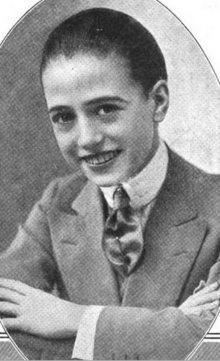Kitty Doner
Kitty Doner (born Catherine Donohue, September 6, 1895 — August 26, 1988) was an American vaudeville performer. She was a male impersonator, actress, and dancer, specializing in boy roles, and later in life worked as a choreographer and television producer.

Early life
Catherine Donohue was born in Chicago, Illinois. Her parents Joe Doner and Nellie Doner, both born in England, were also vaudeville performers, as were her siblings Ted and Rose.[1][2][3]
Career
Kitty Doner was considered the best American male impersonator of her day, compared favorably to British acts such as Vesta Tilley and Ella Shields.[4] She was petite, and her characters were often youthful.[5] She was known for changing from masculine to feminine clothing on stage, in view of the audience, to demonstrate how much of her impersonation was skill rather than elaborate costume.[6] In 1921, she performed at a benefit for the Women's Auxiliary of the National Disabled Soldiers League at the Apollo Theater.[7] That same year, she also performed at a benefit for the American Committee for Relief in Ireland, at the Metropolitan Opera House.[8]
Her Broadway credits included The Passing Show of 1913, Dancing Around (1914, with Al Jolson),[9] Robinson Crusoe Jr. (1916, again with Jolson),[10] Sinbad (1918, again with Jolson), and The Dancing Girl (1923, appearing with her brother and sister).[2] Doner's act was preserved in an early sound short film, A Bit of Scotch (1928).[11]
In 1945 she co-produced a now-lost musical television series for CBS, Choreotones, with dancer Pauline Koner. After that, the pair produced some shows for "Holiday on Ice". Koner remembered, "With a famous show biz career behind her, Kitty was still looking for new trends. Her taste was impeccable. A lively force behind the scenes, she was always scouting material and interesting talent."[12] Her last work before retirement was auditioning acts for Ted Mack's Amateur Hour in the early 1950s.[4]
Personal life
Kitty Doner died in 1988, aged 92 years, in Los Angeles, California.[13] There is a collection of Doner's papers, including an unpublished autobiography, photographs and scrapbooks, archived at the University of California Santa Barbara Library.[14]
References
- Frank Cullen, Florence Hackman, Donald McNeilly, Vaudeville Old & New: An Encyclopedia of Variety Performances in America (Psychology Press 2007): 319-320. ISBN 9780415938532
- Gilliam M. Rodger, Just One of the Boys: Female to Male Cross-Dressing on the American Variety Stage (University of Illinois Press 2018). ISBN 9780252050169
- "Ted Doner Coming Back" New York Times (July 18, 1929): 14. via ProQuest
- Anthony Slide, The Encyclopedia of Vaudeville (University Press of Mississippi 2012): 133-136. ISBN 9781617032509
- "Born to Dance – And She's Doing It" New York Times (October 18, 1914).
- "Kitty Doner Comes Back to Colonial" The Morning Call (February 3, 1929): 11. via Newspapers.com

- "Stars to Aid Soldiers" New York Times (May 7, 1921): 8. via ProQuest
- "Stage Stars Raise $57,000 for Irish" New York Times (April 4, 1921): 2. via ProQuest
- "Kitty Doner as a Stage Door Johnnie is a Start in Jolson's 'Dancing Around'" Star Tribune (September 5, 1915): 32. via Newspapers.com

- "Clothes and the Girl" Green Book Magazine (September 1916): 545.
- Edwin M. Bradley, The First Hollywood Sound Shorts, 1926-1931 (McFarland 2009): 369. ISBN 9781476606842
- Pauline Koner, Solitary Song (Duke University Press 1989): 139-148. ISBN 9780822308782
- "Kitty Doner, Male Impersonator in Vaudeville" Los Angeles Times (September 3, 1988).
- Guide to the Kitty Doner Papers, University of California Santa Barbara Library, Special Collections.
External links
| Wikimedia Commons has media related to Kitty Doner. |
- Kitty Doner on IMDb
- Kitty Doner's listing at IBDB.
- Kitty Doner's listing at Playbill.
- 1923 photograph of Kitty Doner, from the New York World-Telegram and the Sun Newspaper Photograph Collection, Library of Congress.
- A 1921 photograph of Kitty Doner, from the University of Washington Libraries Digital Collections.
- Several photographs of Kitty Doner from the Los Angeles Times files, part of the "Mystery Photo" feature, Los Angeles Times blog (April 9, 2010).